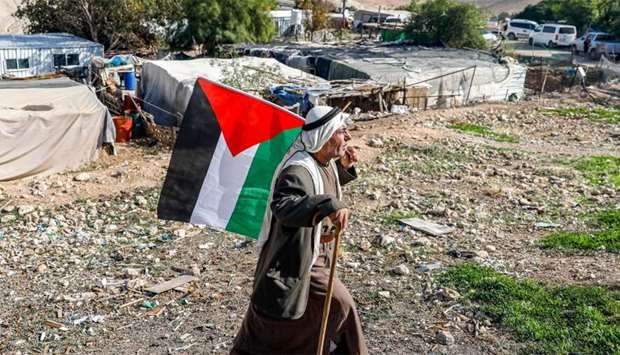Participants in the remote meeting organised by the United Nations to observe the International Day of Solidarity with the Palestinian People affirmed the Palestinian people's right to self-determination and the need to return to serious negotiations that end the occupation and lead to the establishment of a geographically connected and viable Palestinian state.
The International Day of Solidarity with the Palestinian People is observed by the United Nations on or around 29 November each year to reaffirm Palestinian inalienable rights and support an end to the prolonged conflict in the Middle East.
In his virtual speech, Chair of the Committee on the Exercise of the Inalienable Rights of the Palestinian People Cheikh Niang said that the International Day of Solidarity with the Palestinian People comes at a time when the United Nations celebrates its 75th anniversary.
He added that the illegal Israeli occupation of the Palestinian land that has continued for 53 years is exacerbated today by threats of annexation and the imposition of a fait accompli, while Palestinians are still deprived of their inalienable rights, especially their right to self-determination.
The Israeli settlement expansion continues unabated and without accountability, in violation of international law and relevant UN resolutions, especially Security Council Resolution 2334 of 2016, he said, stressing that there must be a complete cessation of settlement construction plans.
President of the UN General Assembly Volkan Bozkir said ‘The parameters for a resolution to the conflict are clear. In 1947, the General Assembly adopted Resolution 181, which formed the legal basis for the establishment of the State of Israel, and a second state, for the Palestinian people. However, in the seven decades that followed, we have failed to establish a state for the Palestinian people.’
‘A two-state solution recognized by Resolution 181, is the only premise for a just, lasting and comprehensive peace between Israelis and Palestinians, to bring security and prosperity to all,’ he said.
He called on the United Nations to continue to support Palestinians and Israelis to resolve the conflict on the basis of international law and bilateral agreements and realizing the vision of two States living side by side in peace and security within recognized borders, on the basis of the pre-1967 lines, stressing that these terms of reference cannot be changed, and that the rights of Palestinian people are not up for negotiations.
For his part, UN Secretary-General Antonio Guterres expressed deep sense of worry about the grim realities in the Occupied Palestinian Territory and the diminishing prospects of resolving the conflict, which has been with the United Nations since its very creation.
‘Israel's suspension of plans to annex parts of the West Bank has removed for the time being a critical threat to peace and regional stability. However, on the ground, the expansion of settlement planning and construction continues, while demolitions and seizures of Palestinian-owned structures by Israeli authorities across the occupied West Bank, including East Jerusalem, reached the highest documented rate in four years,’ Guterres said.
He underlined that such actions are contrary to international law and undermine the prospects for the establishment of a viable, contiguous Palestinian state.
‘I hope that recent developments will encourage Palestinian and Israeli leaders to re-engage in meaningful negotiations, with the support of the international community, toward a two-State solution and will create opportunities for regional cooperation. Only a two-State solution that realizes the legitimate national aspirations of Palestinians and Israelis can lead to sustainable peace,’ he said.
‘The United Nations remains committed to supporting Palestinians and Israelis to resolve the conflict,’ he added. (QNA)

